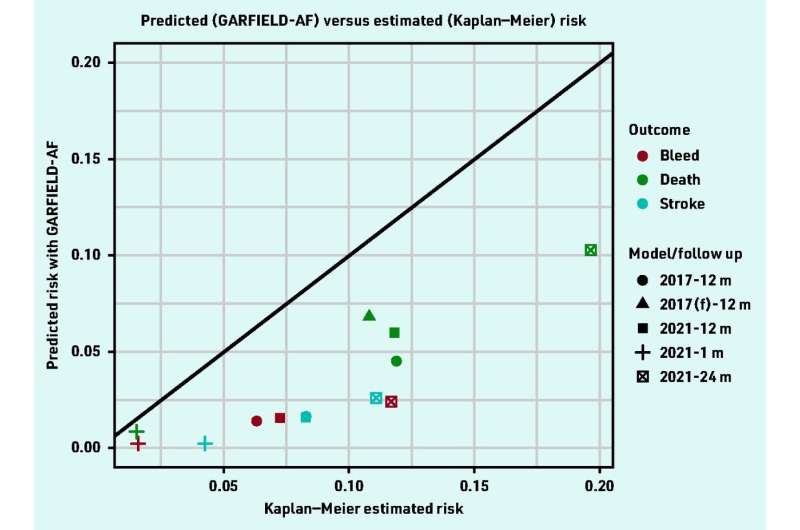This article has been reviewed according to Science X's editorial process and policies. Editors have highlighted the following attributes while ensuring the content's credibility:
fact-checked
peer-reviewed publication
trusted source
proofread
Novel risk tool could help prevent strokes in patients with atrial fibrillation

New research has found that patients in the U.K. with the heart rhythm disorder atrial fibrillation could benefit from a novel prediction tool for assessing the risk of stroke and major bleeding.
The study published in the British Journal of General Practice tested the performance of the GARFIELD-AF tool in the U.K. population using primary care electronic records from more than 460,000 patients. The research project found that the tool had better scores for predicting strokes, major bleeding and death than existing tools used across the U.K.
Dr. Patricia Apenteng, Research Fellow at the Institute of Applied Health Research at the University of Birmingham and lead author of the paper said, "Patients with atrial fibrillation have a five-fold increased risk of having a stroke, so effective management of the condition includes a good understanding of all levels of risk. Our findings attest to the potential of the GARFIELD-AF tool to support the management of atrial fibrillation, and there is a need for validation in routine care."
The team led by researchers at the University of Birmingham and Warwick University tested the GARFIELD-AF tool that predicts the risk of stroke, bleeding and death in the U.K. population, and compared them with CHA2DS2VASc and HAS-BLED tools which are currently in use.
Patients with atrial fibrillation experience abnormal heart rhythms and can lead to increased risk of stroke and death. Anticoagulation therapy is often used in patients to reduce these risks, but it carries a risk of bleeding. The clinical management of atrial fibrillation involves assessing the risk of stroke and the risk of bleeding to determine if anticoagulation therapy would be beneficial in reducing the risk of stroke.
Dr. Patricia Apenteng said, "Adjusting the algorithm for use in U.K. clinical practice would optimize its performance in the U.K. population, and GARFIELD-AF can be embedded in primary care records to support decision-making around anticoagulation. This will ensure that those who need anticoagulation will receive it, and those who do not are not put at unnecessary risk of bleeding complications. The tool also allows the identification of patients with atrial fibrillation who are at risk of early mortality, enabling the initiation of integrated care to improve outcomes."
More information: Patricia N Apenteng et al, Optimising prediction of mortality, stroke, and major bleeding for patients with atrial fibrillation: validation of the GARFIELD-AF tool in UK primary care electronic records, British Journal of General Practice (2023). DOI: 10.3399/BJGP.2023.0082



















